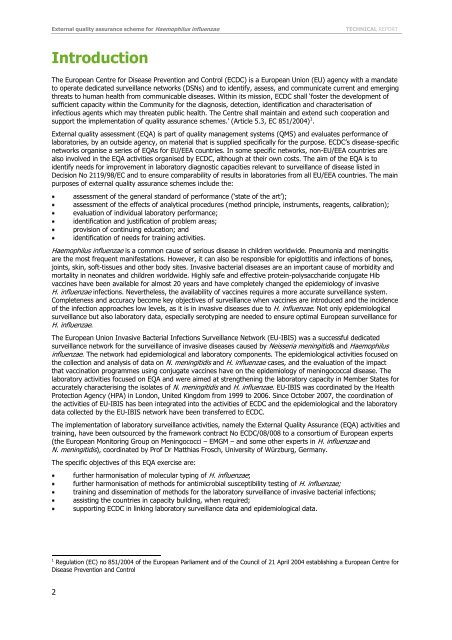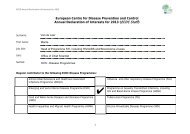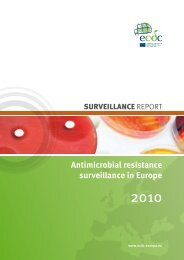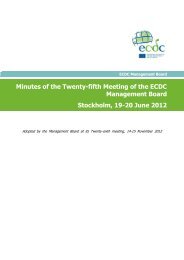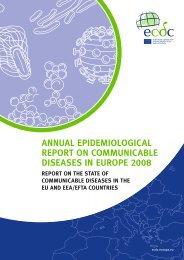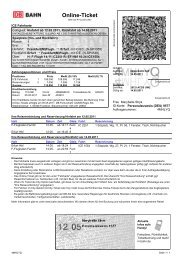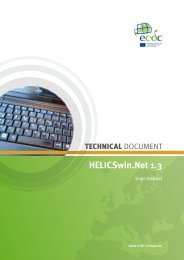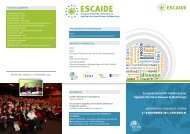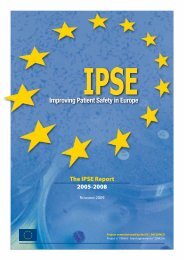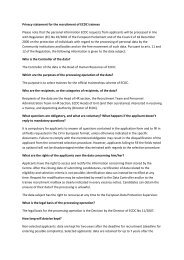External quality assurance scheme for Haemophilus influenzae 2011
External quality assurance scheme for Haemophilus influenzae 2011
External quality assurance scheme for Haemophilus influenzae 2011
Create successful ePaper yourself
Turn your PDF publications into a flip-book with our unique Google optimized e-Paper software.
<strong>External</strong> <strong>quality</strong> <strong>assurance</strong> <strong>scheme</strong> <strong>for</strong> <strong>Haemophilus</strong> <strong>influenzae</strong><br />
TECHNICAL REPORT<br />
Introduction<br />
The European Centre <strong>for</strong> Disease Prevention and Control (ECDC) is a European Union (EU) agency with a mandate<br />
to operate dedicated surveillance networks (DSNs) and to identify, assess, and communicate current and emerging<br />
threats to human health from communicable diseases. Within its mission, ECDC shall ‘foster the development of<br />
sufficient capacity within the Community <strong>for</strong> the diagnosis, detection, identification and characterisation of<br />
infectious agents which may threaten public health. The Centre shall maintain and extend such cooperation and<br />
support the implementation of <strong>quality</strong> <strong>assurance</strong> <strong>scheme</strong>s.’ (Article 5.3, EC 851/2004) 1 .<br />
<strong>External</strong> <strong>quality</strong> assessment (EQA) is part of <strong>quality</strong> management systems (QMS) and evaluates per<strong>for</strong>mance of<br />
laboratories, by an outside agency, on material that is supplied specifically <strong>for</strong> the purpose. ECDC’s disease-specific<br />
networks organise a series of EQAs <strong>for</strong> EU/EEA countries. In some specific networks, non-EU/EEA countries are<br />
also involved in the EQA activities organised by ECDC, although at their own costs. The aim of the EQA is to<br />
identify needs <strong>for</strong> improvement in laboratory diagnostic capacities relevant to surveillance of disease listed in<br />
Decision No 2119/98/EC and to ensure comparability of results in laboratories from all EU/EEA countries. The main<br />
purposes of external <strong>quality</strong> <strong>assurance</strong> <strong>scheme</strong>s include the:<br />
assessment of the general standard of per<strong>for</strong>mance (‘state of the art’);<br />
assessment of the effects of analytical procedures (method principle, instruments, reagents, calibration);<br />
evaluation of individual laboratory per<strong>for</strong>mance;<br />
identification and justification of problem areas;<br />
provision of continuing education; and<br />
identification of needs <strong>for</strong> training activities.<br />
<strong>Haemophilus</strong> <strong>influenzae</strong> is a common cause of serious disease in children worldwide. Pneumonia and meningitis<br />
are the most frequent manifestations. However, it can also be responsible <strong>for</strong> epiglottitis and infections of bones,<br />
joints, skin, soft-tissues and other body sites. Invasive bacterial diseases are an important cause of morbidity and<br />
mortality in neonates and children worldwide. Highly safe and effective protein-polysaccharide conjugate Hib<br />
vaccines have been available <strong>for</strong> almost 20 years and have completely changed the epidemiology of invasive<br />
H. <strong>influenzae</strong> infections. Nevertheless, the availability of vaccines requires a more accurate surveillance system.<br />
Completeness and accuracy become key objectives of surveillance when vaccines are introduced and the incidence<br />
of the infection approaches low levels, as it is in invasive diseases due to H. <strong>influenzae</strong>. Not only epidemiological<br />
surveillance but also laboratory data, especially serotyping are needed to ensure optimal European surveillance <strong>for</strong><br />
H. <strong>influenzae</strong>.<br />
The European Union Invasive Bacterial Infections Surveillance Network (EU-IBIS) was a successful dedicated<br />
surveillance network <strong>for</strong> the surveillance of invasive diseases caused by Neisseria meningitidis and <strong>Haemophilus</strong><br />
<strong>influenzae</strong>. The network had epidemiological and laboratory components. The epidemiological activities focused on<br />
the collection and analysis of data on N. meningitidis and H. <strong>influenzae</strong> cases, and the evaluation of the impact<br />
that vaccination programmes using conjugate vaccines have on the epidemiology of meningococcal disease. The<br />
laboratory activities focused on EQA and were aimed at strengthening the laboratory capacity in Member States <strong>for</strong><br />
accurately characterising the isolates of N. meningitidis and H. <strong>influenzae</strong>. EU-IBIS was coordinated by the Health<br />
Protection Agency (HPA) in London, United Kingdom from 1999 to 2006. Since October 2007, the coordination of<br />
the activities of EU-IBIS has been integrated into the activities of ECDC and the epidemiological and the laboratory<br />
data collected by the EU-IBIS network have been transferred to ECDC.<br />
The implementation of laboratory surveillance activities, namely the <strong>External</strong> Quality Assurance (EQA) activities and<br />
training, have been outsourced by the framework contract No ECDC/08/008 to a consortium of European experts<br />
(the European Monitoring Group on Meningococci – EMGM – and some other experts in H. <strong>influenzae</strong> and<br />
N. meningitidis), coordinated by Prof Dr Matthias Frosch, University of Würzburg, Germany.<br />
The specific objectives of this EQA exercise are:<br />
further harmonisation of molecular typing of H. <strong>influenzae</strong>;<br />
further harmonisation of methods <strong>for</strong> antimicrobial susceptibility testing of H. <strong>influenzae</strong>;<br />
training and dissemination of methods <strong>for</strong> the laboratory surveillance of invasive bacterial infections;<br />
assisting the countries in capacity building, when required;<br />
supporting ECDC in linking laboratory surveillance data and epidemiological data.<br />
1 Regulation (EC) no 851/2004 of the European Parliament and of the Council of 21 April 2004 establishing a European Centre <strong>for</strong><br />
Disease Prevention and Control<br />
2


